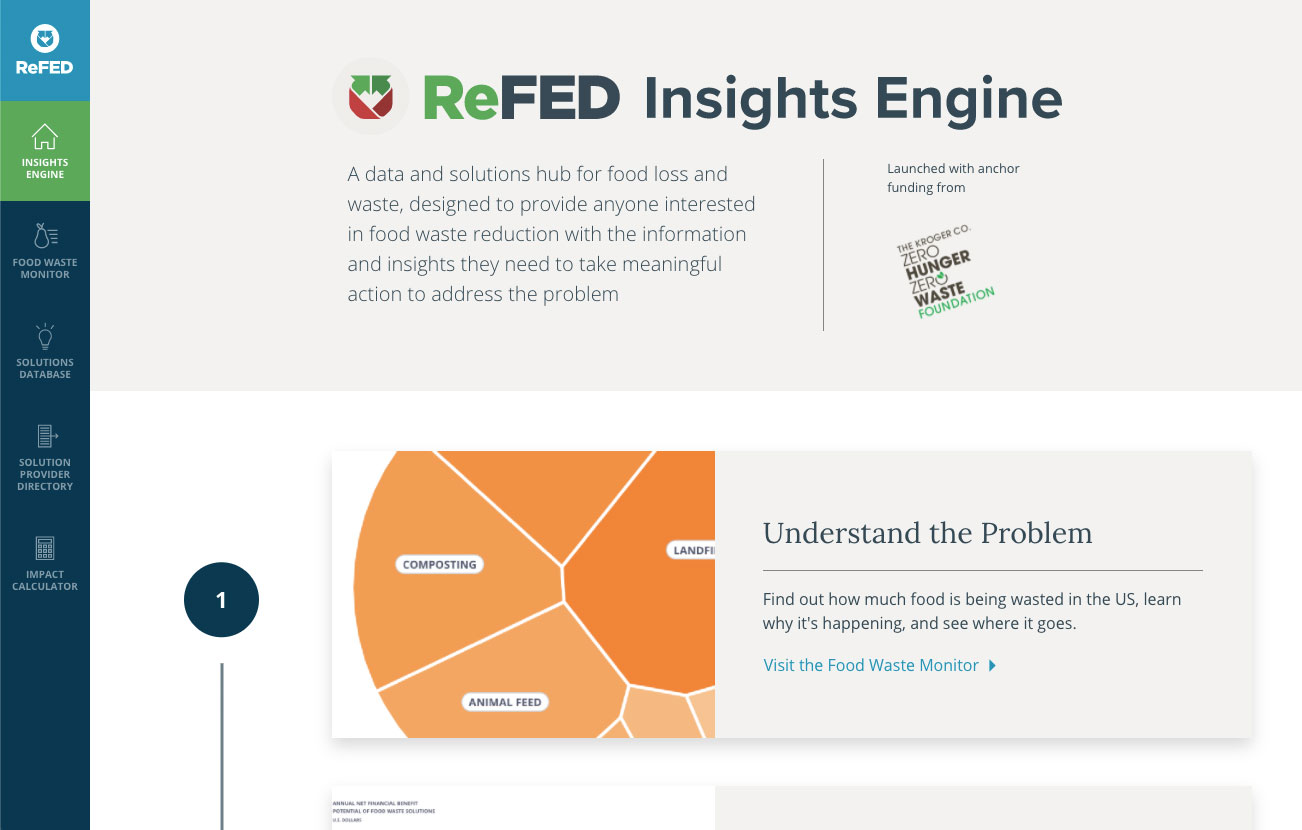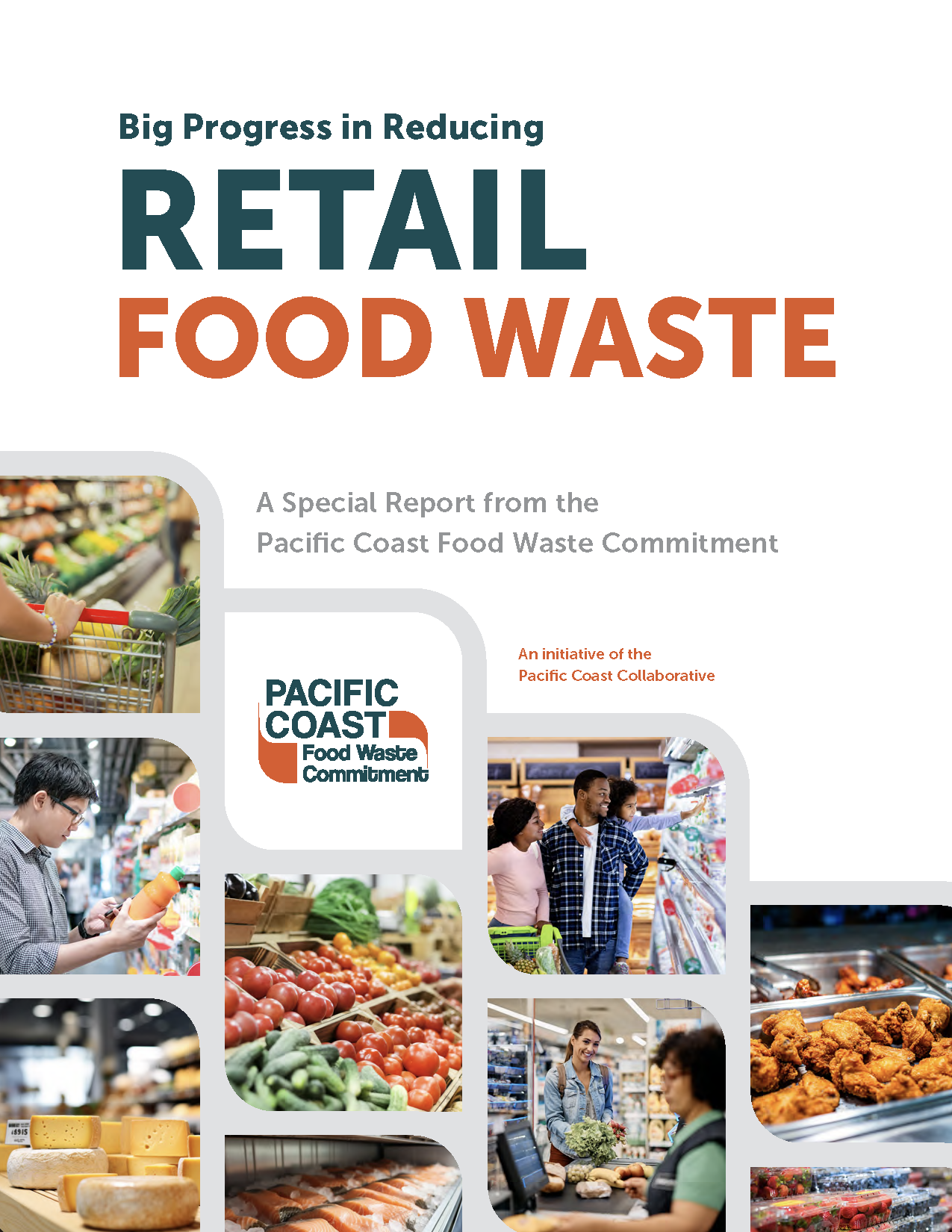Resources and Guides | ReFED
Your Source for Data and Solutions:
ReFED's Insights Engine
The Insights Engine is an online hub for data and insights about food waste built from more than 50 public and proprietary datasets, plus estimates and information from academic studies, industry papers, case studies, and expert interviews; a detailed financial analysis of more than 40 food waste reduction solutions; a directory of organizations ready to partner on food waste reduction initiatives; and more. With more granular data, more extensive analyses, more customized views, and the most up-to-date information, the Insights Engine can provide anyone interested in food waste reduction with the information they need to take meaningful action.


Our Food Waste Tools:
Food Waste Monitor:
Find out how much food is being wasted in the U.S., learn why it's happening, and see where it goes.
Solutions Database:
Learn which food waste reduction solutions are the most relevant and impactful for meeting specific goals.
Solution Provider Directory:
Explore our database of thousands of organizations offering products and services to help you reduce food waste.
Impact Calculator:
Quantify the climate, natural resource, and food security impacts of wasted food.
Capital Tracker:
Identify food waste investment and grant-giving trends over time.
Policy Finder:
Monitor current and upcoming food waste-related policies at the federal, state, and municipal levels.
Reports & Action Guides

Big Progress in Reducing Retail Food Waste
A Special Report from the Pacific Coast Food Waste Commitment
A new study from the Pacific Coast Food Waste Commitment — for which ReFED is a resource partner — shows that grocery retailers along the West Coast made the most significant progress ever reported in the United States on reducing food waste in the retail sector. This analysis shows that from 2019 to 2022, grocery retailers decreased the number of tons of unsold food in their regional operations by 25%, which has big implications for food waste reduction, climate change, dollars saved, and more.
2023 Annual Impact Report
Download ReportBuilding a Food System That Works for Everyone: A Look at the Intersection of Food Waste with Justice, Equity, Diversity, and Inclusion
Download Assessment2023 Mid-Year Impact Report
Download Report2022 Annual Impact Report
Download 2022 Annual Impact Report2022 Year-End Report for the Pacific Coast Food Waste Commitment
Download 2022 Report2023 Female Led Solution Providers | International Women's Day 2023
DownloadHow Food Waste Solutions Can Drive Methane Mitigation
Download Report2021 Annual Impact Report
Download 2021 Annual Impact Report2021 Mid-year Impact Report
DownloadReFED, Inc. Female Led Solution Providers_IWD 2022
ReFED, Inc. Female Led Solution Providers- IWD 20222020 Annual Report
Download 2020 Annual ReportScaling Action: Opportunities for Food Waste Solution Providers to Engage with ReFED
Download DocumentReFED 2020 COVID-19 Food Waste Solutions Fund Impact Report
Download2019 Annual Report
2019 Annual ReportPCC 2020 End-of-Year Report
DownloadScaling Food Recovery and Hunger Relief: Learnings from ReFED’s Nonprofit Food Recovery Accelerator
Scaling Food Recovery and Hunger Relief: Learnings from ReFED’s Nonprofit Food Recovery AcceleratorAccelerator Expert Network Knowledge Series: Bill Reighard, Food Donation Connection
Accelerator Expert Network Knowledge Series: Bill Reighard, Food Donation ConnectionAccelerator Expert Network Knowledge Series: Doug Rauch, Daily Table
Accelerator Expert Network Knowledge Series: Doug Rauch, Daily TableAccelerator Expert Network Knowledge Series: Eric Davis And Justin Block, Feeding America
Accelerator Expert Network Knowledge Series: Eric Davis And Justin Block, Feeding AmericaAccelerator Expert Network Knowledge Series: Hannah Koski, Blue Apron
Accelerator Expert Network Knowledge Series: Hannah Koski, Blue ApronAccelerator Expert Network Knowledge Series: Jasmine Crowe, Goodr
Accelerator Expert Network Knowledge Series: Jasmine Crowe, GoodrAccelerator Expert Network Knowledge Series: Jessica Grace Torres, City Harvest
Accelerator Expert Network Knowledge Series: Jessica Grace Torres, City HarvestAccelerator Expert Network Knowledge Series: Kari Armbruster, The Kroger Co.
Accelerator Expert Network Knowledge Series: Kari Armbruster, The Kroger Co.Accelerator Expert Network Knowledge Series: Leah Lizarondo, 412 Food Rescue
Accelerator Expert Network Knowledge Series: Leah Lizarondo, 412 Food RescueAccelerator Expert Network Knowledge Series: Nell Fry, Sodexo
Accelerator Expert Network Knowledge Series: Nell Fry, SodexoAccelerator Expert Network Knowledge Series: Nicole Flewell, Taylor Farms
Accelerator Expert Network Knowledge Series: Nicole Flewell, Taylor FarmsAccelerator Expert Network Knowledge Series: Rebeckah Piotrowski, City Harvest
Accelerator Expert Network Knowledge Series: Rebeckah Piotrowski, City HarvestAccelerator Expert Network Knowledge Series: Robert Egger, LA Kitchen
Accelerator Expert Network Knowledge Series: Robert Egger, LA KitchenAccelerator Expert Network Knowledge Series: Thomas Mcquillan, Baldor Specialty Foods
Accelerator Expert Network Knowledge Series: Thomas Mcquillan, Baldor Specialty FoodsFoodservice Food Waste Action Guide
Foodservice Food Waste Action GuideFoundation Action Guide
Foundation Action GuideQuantis Greenhouse Gas Emissions of Food Waste Methodology
Quantis Greenhouse Gas Emissions of Food Waste MethodologyReFED Food Waste Infographic
DownloadRestaurant & Food Service Reopening Guidelines
Restaurant & Food Service Reopening GuidelinesRestaurant Food Waste Action Guide
Restaurant Food Waste Action GuideRetail Food Waste Action Guide
Retail Food Waste Action GuideThe 2016 Roadmap to Reduce U.S. Food Waste by 20 Percent
2016 Roadmap to Reduce U.S. Food Waste by 20 Percent Full Report 2016 Roadmap to Reduce U.S. Food Waste by 20 Percent Executive Summary 2016 Roadmap to Reduce U.S. Food Waste by 20 Percent Technical Appendix2018 U.S. Food Waste Investment Report
2018 U.S Food Waste Investment Report 2018 U.S Food Waste Investment Report Technical AppendixU.S. Grocery Retail Dollar-to-Weight Conversion Factors
DownloadU.S. Grocery Retail Dollar-to-Weight Conversion Factors
U.S. Grocery Retail Dollar-to-Weight Conversion FactorsU.S. Grocery Retail Food Inedible Parts Factors
U.S. Grocery Retail Food Inedible Parts FactorsU.S. Grocery Retail Food Packaging to Product Ratios
U.S. Grocery Retail Food Packaging to Product RatiosGrants Database
Compiled by the Natural Resources Defense Council (NRDC) and ReFED, the Grants Database is a centralized place to see federal grants that could help fund your food waste reduction initiatives. If you have a grant funding opportunity to add, please contact [email protected].
